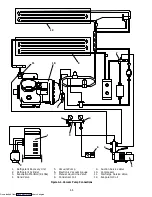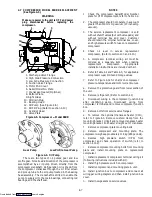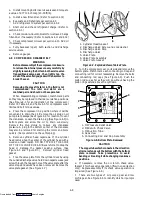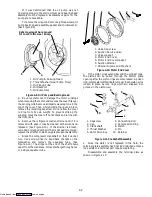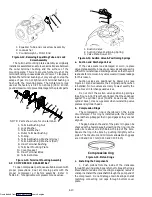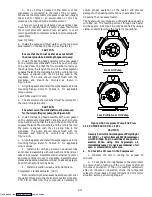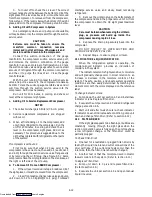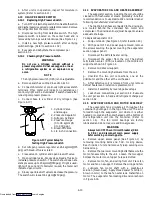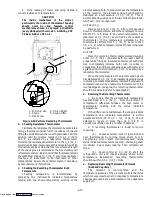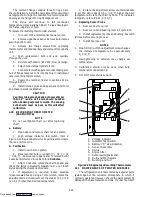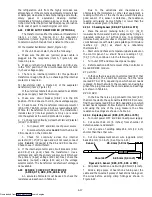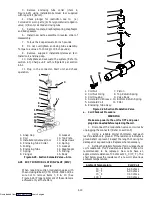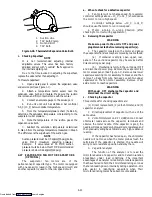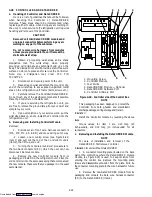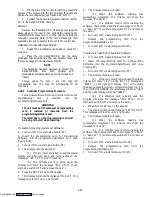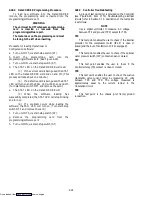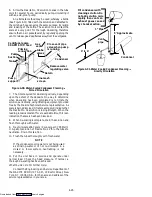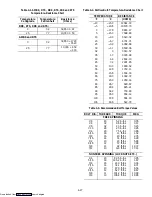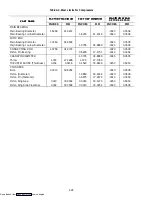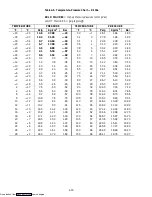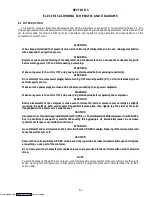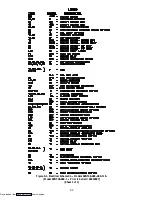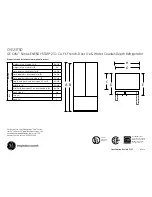
4-19
3. Remove enclosing tube collar (item 4,
Figure 4-25) using installation/removal tool supplied
with repair kit (item 3).
4. Check plunger for restriction due to:
(a)
Corroded or worn parts; (b) Foreign material lodged in
valve; (c) Bent or dented enclosing tube.
5. Remove top plate, diaphragm spring, diaphragm
and body gaskets.
6. Install new parts, assemble in reverse order of
disassembly.
7. Torque the 4 capscrews to 40 inch pounds.
8. Do not overtighten enclosing tube assembly.
Torque to a value of 1.15 mkg (100 inch pounds).
9. Remove supplied installation/removal tool.
Install coil, and snap cap.
10. Dehydrate and evacuate the system. (Refer to
section 4.5) Charge unit with refrigerant per section
4.6.1.
11. Plug in the connector. Start unit and check
operation.
10
11
12
13
14
15
1
2
5
6
7
4
8
9
16
3
1. Snap Cap
2. Coil
3. Installation/Removal Tool
4. Enclosing Tube Collar
5. O-Ring
6. Enclosing Tube
7. Spring
8. Plunger
9. Gasket
10. Top Plate
11. Capscrews
12. Spring
13. Gasket
14. Diaphragm
15. O-Ring
16. Body
Figure 4-25. Suction Solenoid Valve --- Alco
4.25 SUCTION MODULATION VALVE (SMV)
NOTE
When repairing suction modulation valve with
the enclosing tube kit (CTD P/N 14-50021-01) be
sure not to remove items 7, 8 & 10. (See
Figure 4-26) Proper alignment of these items is
achieved only at the factory.
1
2
3
4
5
6
7
8
9
10
11
1. Coil Nut
2. Coil Nut O-ring
3. Coil Housing
4. Solenoid Coil Sleeve
5. Solenoid Coil
6. Enclosing Tube Assy.
7. Piston
8. Top Return Spring
9. Valve Body
10. Bottom Return Spring
11. Filter
Figure 4-26. Suction Modulation Valve
a. Coil Checkout Procedure
WARNING
Make sure power to the unit is OFF and power
plug disconnected before replacing the coil.
1. Disconnect the modulation valve coil wires by
unplugging the connector (Refer to section 5).
2. Using a reliable digital ohmmeter, test each
lead’s resistance to ground. If the resistance indicates a
ground short is present, inspect the length of wiring for
damaged or exposed wires. Replace where necessary.
3. Setting the digital ohmmeter for low range check
coil’s resistance. If coil’s resistance is below 5 ohms it is
recommended to be replaced. New coils have an
approximate resistance of 7.6 ohms at 25
_
C (77
_
F). The
chart below gives the resistance of a new coil at various
ambient temperatures.
Ambient Temperature
Cold Coil
10
_
F
6.45 ohms
40
_
F
6.90 ohms
70
_
F
7.40 ohms
100
_
F
7.90 ohms
Downloaded from


